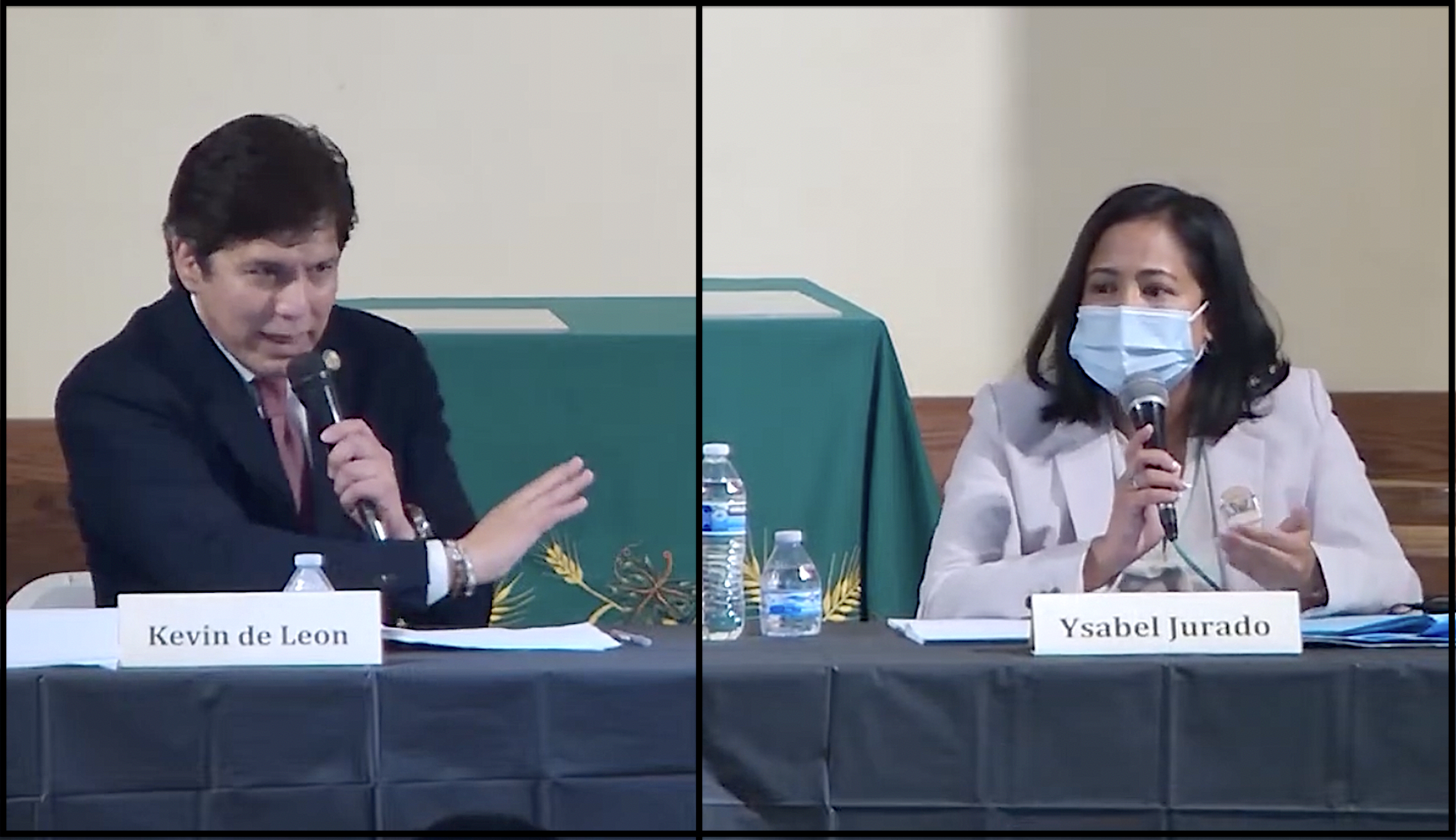"I've made mistakes, without a doubt," disgraced CD14 councilmember Kevin de León said in Spanish as he concluded his combative introductory remarks at last Wednesday night's bilingual candidate debate hosted by Boyle Heights Beat and Proyecto Pastoral at Dolores Mission Catholic Church in Boyle Heights. "But - and I want to underscore this - I don't lie. I don't lie. And my opponent has lied a lot."
It was a hint of what was to come: de León latching onto the Spanish word for "lie" and accusing CD14 frontrunner Ysabel Jurado of being a lying liar who lied a lot almost every time it was his turn to speak.
But, of course, it was also a lie.
As L.A., and much of the nation, is well aware, de León lied incessantly while making his wretched apology rounds in the days and weeks following the October 2022 leaked recording of a profoundly racist discussion he had had a year earlier with former City Council president Nury Martinez, former city councilmember Gil Cedillo, and then-L.A. Labor Federation president Ron Herrera about how to manipulate both the redistricting process and the filling of a vacant historically Black council seat in ways that would help all four of them consolidate their hold on power.
Rather than acknowledge how his own seething resentments and anti-Blackness - exhaustively detailed in this author's previous reporting - had been the primary drivers of the worst parts of that conversation, he claimed he had been cowed into silence by a brash and overbearing Martinez. He told ABC7’s Marc Brown he was sorry for what he said was his one - and only(!!) - failure that day: not speaking up when Martinez called Ktown Oaxacans "ugly."
He was still rewriting that history just last month, telling KNX that the media had pushed a “false narrative” about the leaked tape. The redistricting discussion - which, among other things, involved him claiming current council president Marqueece Harris-Dawson and other Black leaders were actively seeking to impoverish Latino districts in order to thwart de León's mayoral bid - was actually about “making sure that the Voting Rights Act was respected among people of color," he said.
It was therefore no surprise that, on the second anniversary of the racist audio leak, de León was still on the defensive. But it didn't make the way the 57-year-old attacked the 34-year-old Jurado sound any less unhinged.
During the bilingual debate hosted by @boyleheightsbt & Proyecto Pastoral Wed. night, KDL was far more openly resentful in tone & word choice in Spanish than when switching to English. Here he accuses Jurado of being a whining do-nothing whiner who whines. pic.twitter.com/DigjDrJdr6
— sahra (@sahrasulaiman) October 12, 2024
He accused Jurado of lying about having COVID to get the debate - initially scheduled for October 5 - postponed (Jurado denied this and chided de León for having people follow her daughter around a mall). He also said she was lying about how he was taking money from wealthy rightwing donors whose interests do not align with those of Boyle Heights residents (via L.A. Public Press and his ethics filings, his donors include real estate investors, lobbyists, hotel interests, dubious landlords, and, notably, fellow disgraced Fed tapees Cedillo and Herrera).
Rather than engaging her critiques of encampment sweeps, the impounding of RVs people lived in, and tiny homes as temporary solutions that were ultimately harmful to the unhoused, he said Jurado was lying about his record of building interim shelters and pointed to the presence of Ramiro Becerra, a mariachi from Jalisco who has been living in a tiny home village for the past eight months, as proof of his success.
And when asked how he would handle ethics violations in Council, he said in English that he had voted to approve ethics commissioners and would rely on them to do their duty before quickly switching back to Spanish to accuse Jurado of lying again. She had emphasized her refusal to take money from special interests, big corporations, slumlords, or big developers and argued de León would be beholden to some of the more unsavory interests he had accepted donations from. De León said these were more of her lies, accused her of not having set foot in Boyle Heights until last year, and asked how he could possibly be against his own people when he had written the landmark sanctuary state legislation, was building parks in the community, and did food distributions.
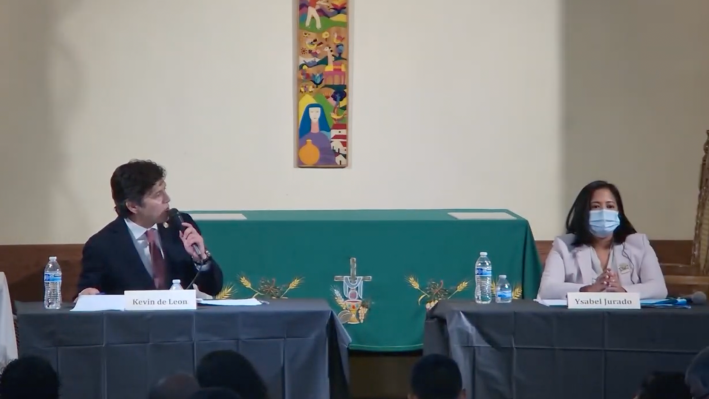
Interestingly, it was the unique format - highlighted by Fr. Brendan Busse, as the only bilingual debate this election season - that gave de León the flexibility to accuse Jurado of lying in biting, scolding Spanish.
That he was much more measured in English, both in tone and word choice, said much about the cynical way he had approached rehabilitating his reputation with Spanish speakers in his district.
He had made Spanish-language media the first stop on his apology tour two years ago. With the bulk of the tape not being translated into Spanish and Martinez' hideous comments serving as the major flashpoint for the furor (in both Spanish- and English-language media), de León had depicted himself as a humbled and contrite man seeking grace and forgiveness from his people. He told Univisión's León Krauze that he was "uncomfortable" and "in shock" throughout the "horrible" and "disgraceful" conversation and told Telemundo’s Julio Vaqueiro that the disparagement of a colleague's Black toddler and Oaxacans were unequivocally "racista, por parte de mi ex-colega" (racist - on my ex-colleague Martinez' part).
Within weeks, however, he was back to pulling from the divide-and-conquer playbook.
Claiming he was being blamed for Martinez' crimes, he framed his own ostracization as an attempt to punish his Latino constituents. He panicked impoverished immigrant families and seniors into believing that his colleagues were trying to snatch food out of their mouths (when Council explored penalties for censured councilmembers like himself). And he claimed the protesters who accused him of racism were outsiders who couldn't care less about the needs of his people.
The ugly results spoke for themselves. When his supporters showed up to City Hall to help ease his return to chambers post-scandal, some leaned very loudly into anti-Blackness (below).
KDL is not sending his best ambassadors: "You [Black people] continue to hang our people [Latinos] and it's got to stop." https://t.co/NRet5kUUaN
— sahra (@sahrasulaiman) December 14, 2022
Some of those same supporters seemed to be in the debate audience last Wednesday, jeering and cheering de León’s bigger rhetorical flourishes even after being admonished more than once to hold their applause.
Fr. Busse's gentle entreaty that the candidates focus on the questions and less on each other went similarly unheeded.
Of the two, de León seemed to struggle the most with that request. He rarely answered a question directly or stayed on topic, preferring instead to reference his sanctuary state legislation, underscore his connection to "nuestra gente"/"our people" (as a way to signal Jurado, who spoke mostly English throughout the night, was an outsider), tout the number of interim homeless housing beds he had created, and accuse Jurado, a tenants' rights attorney, of being all (socialist) ideology and no substance.
Yet few of the "hechos concretos" (tangible accomplishments) he claimed distinguished his record from Jurado's were fully his own.
Planning for the oft-referenced Mathews St. Pocket Park and PARC project (currently under construction under the Sixth St. Viaduct), for example, both predated his tenure by a number of years. And the new stoplight at 4th and Clarence - which he pointed to as evidence of how well he listened to the community and women, in particular - was tied to a suite of improvements around the Sixth Street Viaduct that the city sought an Active Transportation grant for back in 2015.
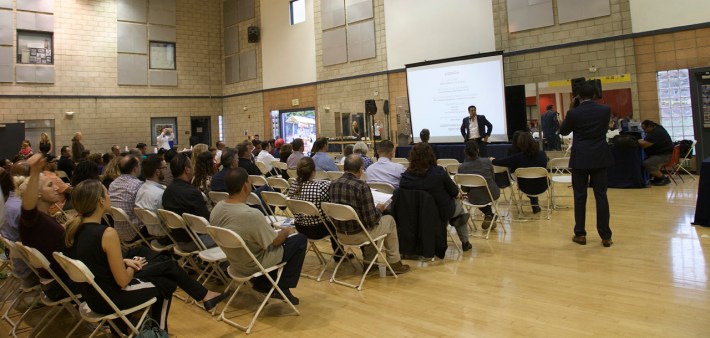
Even his food distributions carry their own asterisk. Per reporting by L.A. Public Press, de León sent out a million-plus pieces of mail in 2023 - nearly half a million dollars' worth - ensuring people would associate his office with the regular giveaways.
He cashed those chips in several times during the debate, most memorably while responding to the question of how he would address the alarming growth of unhoused elders. After a few rambling platitudes about how hard single women work and his effort to build accessible units in Boyle Heights, he suddenly pivoted to remind attendees about Friday's upcoming distribution. He then ticked off a list of foods in Spanish - "rice, beans, tortillas, quality chicken - the same chicken they sell in Whole Foods because our people also deserve good things" - before returning to a Trump-style stream of consciousness that included a reminder that women live longer than men.
The moderators were not to blame for the madness.
Boyle Heights Beat youth reporter and Mendez High School senior David Garcia and Proyecto Pastoral board member Lilia Acosta asked questions drawn from The Beat's community survey, which had asked CD14 residents to share their most pressing concerns. Nearly 500 people had replied, citing affordable housing, crime and safety, and homelessness as their top issues. As noted in the great debate write-ups by The Beat reporters (here and here), accountability, ethics, and trust building were the subject of about half of the write-in questions participants submitted.
The reassurances constituents were seeking went well beyond de León's many failings. Their incarcerated former CD14 councilmember, José Huizar, had had to step down early in 2020, after his pay-to-play schemes with downtown real estate developers came to light. Last year, CD10's Mark Ridley-Thomas was found guilty of corruption after working to provide his then-assemblymember son with a welcoming place to land at USC as a sexual harassment investigation into his behavior in the Legislature ramped up. And two sitting councilmembers have their own troubles: CD12's John Lee (also known as "City Staffer B"), who is currently being investigated by the Ethics Commission for allegedly enjoying some of the same ill-gotten benefits as his corrupt then-boss (former councilmember Mitch Englander) and CD9's Curren Price, who is battling charges of embezzlement and perjury.
But de León had little in the way of reassurances to offer.
He waxed vaguely about there having been "a lot of healing" and "a lot of love," ticked off a brief list of Black allies, and appeared to liken his work with "my brother, Najee Ali" (seen below) to the Black-Latino bridges Biddy Mason, the formerly enslaved landowner and founder of the First AME in L.A., had built with the likes of Pio Pico, the last governor of Alta California.
Those who still cared about the racist scandal were trapped in the past and scratching at scabs for political purposes, he said.
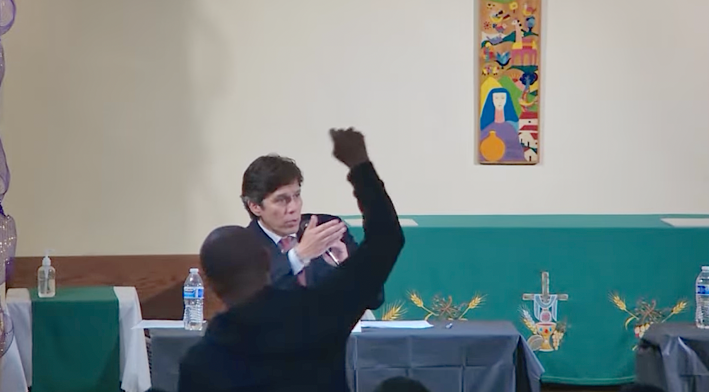
A politician as seasoned as de León should have had so much more to offer.
Jurado's performance was not unimpeachable. She was able to clearly articulate challenges faced by low-income and/or immigrant tenants and her vision for a city that invested in more comprehensive services for youth, the poor, and the unhoused. She denied claims she wanted to abolish police, acknowledged different communities view safety differently, and touched on ways to redirect some of the police budget to address gang violence and the roots of crime.
But she also faltered when trying to tie de León's two-month absence from Council to streetlight maintenance or implying he was responsible for the approval of an affordable housing development project with zero parking (the Wabash St. project - which generated controversy in the community because of the lack of parking - was expedited under via Executive Directive 1, the mayoral initiative which significantly curtails opportunities for input).
Had de León been able to get out of his own way, he might have used those moments to showcase a superior familiarity with city processes sans sneers.
But he doesn't have a superior familiarity with city processes.
As this author reported earlier this year, during the long-overdue effort to update the city's street vending ordinance, he demonstrated a truly astonishing lack of understanding of how ordinances are written. And he managed to do so while (falsely) claiming to be a co-author of the state vending bill and showcasing just how little he knew about the legal and technical barriers street vendors from his own district faced.
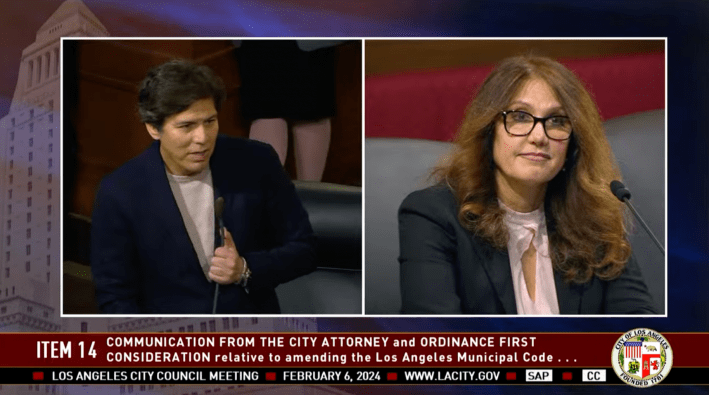
Whether last week's debate performance will be effective with the constituents he appeared to be working extra hard to reach - the female monolingual Spanish speakers he addressed directly multiple times - remains to be seen.
But he was clearly determined to work every angle. Even on his way out the door. Speaking to CALÓ News reporter Brenda Verano after the debate, he unconvincingly expressed surprise that elections could get ugly. Without naming Jurado explicitly, he accused her of "Trumpyism" - "where you just say what you want to say...and think you can get away with it."
For her part, Jurado sounded unbothered and reiterated a point she had made in her introductory remarks. "It's really disappointing that only now he has all these ideas and plans for this district when he really has left it behind," she told Verano. "And that's what we keep hearing at the doors."
See the full livestream of the debate here.
